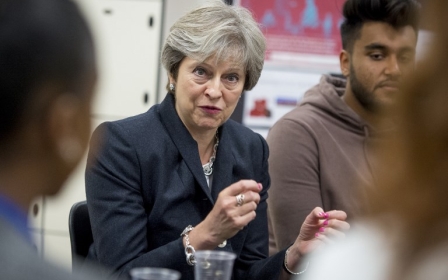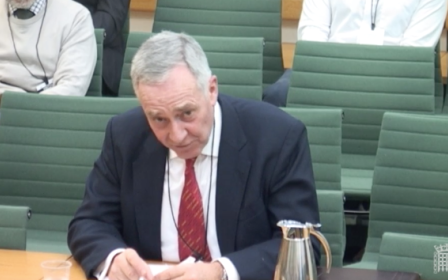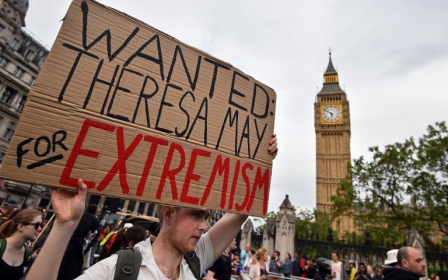Prevent must be 'revamped' says UK's top counter-terrorism police officer

One of the UK's most senior counter-terrorism police officers has called for the government to appoint an independent reviewer of the controversial Prevent counter-terrorism strategy.
Neil Basu, a deputy assistant commissioner at the Metropolitan Police, used an interview with the Combating Terrorism Center at West Point to call for the Home Office to “revamp” Prevent, which has been widely criticised amid concerns that it discriminates against Muslims.
“Government will not thank me for saying this, but an independent reviewer of Prevent... would be a healthy thing... Prevent is, as a Prevent officer who used to work for me said, five percent of the budget but 85 percent of the conversation," he said.
Basu said the Prevent strategy was the “most important pillar” of the government's counter-terrorism agenda and that the “hangover of toxicity” around the programme needed to stop, but called for Prevent to be overhauled to improve its effectiveness.
In the interview with Raffaello Pantucci, the director of International Security Studies at security think tank RUSI, he said: “People need to understand that this is about stopping people in the pre-criminal space ever getting anywhere near criminality. And Prevent needs to concentrate on how it does that. That cannot be a job for the police and security services. That has got to be a wider societal pillar.
"The more that policing and security service could withdraw from Prevent in order to focus Prevent work on problem-solving within communities and getting communities to deal with it, the better in the long-term,” he said.
He added that Prevent “is owned by the government” and that instead local communities should “take the lead” in combating terrorism.
"Local leaders around the country should be standing up and talking about this, not central government, security services, and counter-terrorism police," he explained.
"Communities should be talking about protecting themselves from the grassroots up.”
In an intervention, which may prove embarrassing for government ministers, he said that until now, the Prevent message to communities had been poor.
“Rather than the government handing over a sum of money and then it becoming state-sponsored with accusations of demonising communities, it should be locally generated," he said. "We have gotten all of that messaging the wrong way around, it should be grassroots up.”
He cited London mayor Sadiq Khan as a good example, where local voices with “real gravitas in their communities” were being pushed to the front.
“He is not central government, he runs a city, and the protection of the city is his concern, he should be doing that, not MI5, not the Cabinet, and the National Security Council and New Scotland Yard.”
Basu's comments were welcomed by David Anderson, the UK's former counter-terrorism legislation watchdog, who has also called for an independent review of Prevent to address Muslim community concerns about the programme.
Basu also used the interview to warn that the threat from terrorism had shifted from Iraq and Syria to Libya.
“You would be completely foolish not to worry about Libya. All of the coalition thinks that that is going to be a tremendous problem in years to come. Anywhere there is ungoverned space, anywhere there is fragile political governance is a potential source of threat.”
He added that it would take a “huge leap of faith” to say that Salman Abedi, the Manchester Arena suicide bomber, was not travelling to and from Libya with some “malicious intent”.
Basu, who is responsible for delivering the police response to the Pursue and Prevent elements of the government’s counter-terrorism strategy, said he thought it was likely that more British citizens, who had travelled to fight in Syria, were in captivity than authorities were aware of.
“I think there’s probably more in detention overseas, including in YPG or Kurdish or SDF detention, than we currently know," he said, referring to the location of a significant number of British nationals who signed up to fight with militant groups in Syria and Iraq.
"We obviously won’t know everyone who’s died. It’s a warzone and difficult to be definitively accurate. We estimate that 15 percent of the 850 foreign fighters that have travelled from the UK to Syria and Iraq have died.
"There are some we absolutely know died, and there are ones we guess are deceased because, for example, they are no longer communicating. Establishing the fate of the others is going to be very difficult."
He said that those still at large would most likely “want to fight on” rather than return to the UK.
“For those ... who end up coming back, we are absolutely waiting for them. That’s the bottom line.”
New MEE newsletter: Jerusalem Dispatch
Sign up to get the latest insights and analysis on Israel-Palestine, alongside Turkey Unpacked and other MEE newsletters
Middle East Eye delivers independent and unrivalled coverage and analysis of the Middle East, North Africa and beyond. To learn more about republishing this content and the associated fees, please fill out this form. More about MEE can be found here.




